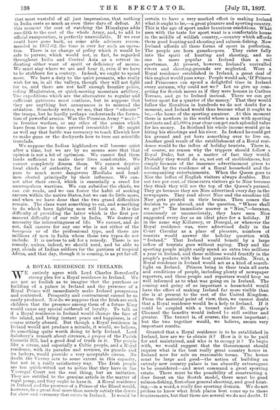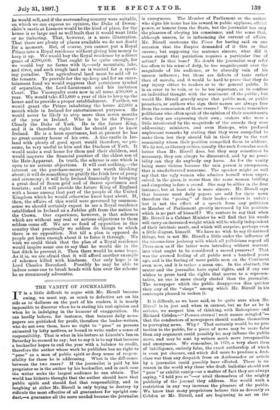A ROYAL RESIDENCE IN IRELAND.
WE entirely agree with Lord Charles Beresford's strong plea for a Royal residence in Ireland. We are not so foolish as to imagine that the purchase or building of a palace in Ireland and the presence of a Royal Prince will immediately make Ireland prosperous and contented. Prosperity and contentment cannot be so easily produced. Nor do we suppose that the Irish are such children that the presence among them of a future King would cause any special outbreak of loyalty. To talk as if a Royal residence in Ireland would change the face of the island, and bring instant peace and happiness, is of course utterly absurd. But though a Royal residence in Ireland would not produce a miracle, it would, we believe, do something quite worth doing to help Ireland. Lord Salisbury's remark about circuses, a propos of the Parish Councils Bill, had a good deal of truth in it. The people like a circus, and especially a Celtic people, and a Royal residence, with its parades and reviews, its guards and its lackeys, would provide a very acceptable circus. No doubt the Viceroy acts to some extent in this capacity, but not in a really satisfactory way. The Irish people are too quick-witted not to notice that they have in the Viceregal Court not the real thing, but an imitation. They are entitled to the genuine article in the matter of regal pomp, and they ought to have it. A Royal residence in Ireland and the presence of a Prince of the Blood would, however, do a great deal more than merely satisfy the desire for show and ceremony that exists in Ireland. It would be certain to have a very marked effect in making Ireland what it ought to be,—a great pleasure and sporting country. This is the age of sport under luxurious conditions. What men with the taste for sport want is a comfortable house in the middle of wildish country,—country which affords them good hunting and shooting and salmon-fishing. Now Ireland affords all these forms of sport in perfection. The people are born gamekeepers. They enter fully into the spirit of hunting and shooting, and no one is more popular in Ireland than a real sportsman. At present, however, Ireland's unrivalled rivers and shooting-grounds are neglected. Were a Royal residence established in Ireland, a great deal of this neglect would pass away. People would ask, 'If Princes and Princesses can spend a delightful time in Ireland every autumn, why could not we ? Let us give up com- peting for Scotch moors as if they were houses in Canton Terrace, and go to Ireland instead. There we can get better sport for a quarter of the money.' That they would follow the Royalties in hundreds we do not doubt for a moment, and Ireland would thus become what it ought to be,—the home of the sporting amateur. At this moment there is nowhere in the world where a man with sporting instincts and ..5,000 a year clear can get such splendid value for his money. In Scotland his whole income would go in hiring his shootings and his river. In Ireland he could get his ground and yet have something over to live on. Another good result of the establishment of a Royal resi- dence would be the influx of holiday tourists. There is, of course, no reason why the trippers should follow a Royal Duke, but as a matter of fact they would. Probably they would do so, not out of snobbishness, but simply because of the immense advertisement given to Ireland by the residence of a Royal household and the accompanying entertainments. When the Queen goes to Nice the influx of English visitors always doubles. But not two per cent, of these extra visitors go to Nice because they think they will see the top of the Queen's parasol. They go because they see Nice advertised every day in the newspapers. They read about Nice and the sunshine till Nice gets printed on their brains. Then comes the decision to go abroad, and the question, "Where shall we go ?" The immediate answer is "Nice,"—because, consciously or unconsciously, they have seen Nice suggested every day as an ideal place for a holiday. If in the same way Killarney, or Donegal, or wherever the Royal residence was, were advertised daily in the Court Circular as a place of pleasure, numbers of tourists would answer the holiday question with "Ireland." That Ireland would benefit by a large inflow of tourists goes without saying. They and the sporting people might easily spend an extra two millions a year in Ireland, and those millions would fructify in the people's pockets with the best possible results. Next, a Royal residence in Ireland would act as a kind of search- light on Ireland. Princes bring in their train all sorts and conditions of people, including plenty of newspaper reporters, and these people and reporters would keep us well informed as to what was going on in Ireland. The coming and going of so important a household would have the effect of making Ireland far more visible than she is at present to the rest of the United Kingdom. From the material point of view, then, we cannot doubt that a Royal residence would be a help to Ireland. If it could be coupled with a tunnel under St. George's Channel the benefits would indeed be still swifter and greater. The tunnel is, of course, the more important ; but the two together would, we believe, secure very important results.
Granted that a Royal residence is to be established in Ireland, how are we to obtain it ? How is it to be paid for and maintained, and who is to occupy it ? To begin with, we would suggest that the Government should inquire what is the best really great country house in Ireland now for sale on reasonable terms. The house must be large and good—the notion of building an entirely new country palace is too absurdly extravagant to be considered--and must command a great sporting estate. There must be the possibility of constructing a deer forest on the Scotch model, there must be good salmon-fishing, first-class general shooting, and good hunt- ing,—in a word, a really fine sporting domain. We do not profess to know what Irish places best come up to these requirements, but that there are several we do not doubt. If be would-sell,and if the surrounding country were suitable, on which we can express no opinion, the Duke of Devon- shire's castle at Lismore would be the kind of place, for the house is so large and so well built that it would want little or no tinkering. That, however, is a mere illustration. That there are plenty of places available we do not doubt for a moment. But, of course, you cannot put a Royal Prince into a Royal residence without giving him money to keep it up. We would buy the Royal residence by a direct grant of £200,000. That ought to be quite enough, for we would buy no farms with it,—only mountain, lake, and river, and such rough land as is wanted for a sport- ing paradise. The agricultural land must be sold off to the tenants. To provide for the up-keep and for an enter- tainment fund we would suppress that pernicious symbol of separation, the Lord-Lieutenant and his imitation Court. The Viceroyalty costs now in all some £30,000 a year. We would take £15,000 a year of this to keep up the house and to provide a proper establishment. Further, we would grant the Prince inhabiting the house £2,000 a month while in Ireland for entertainment purposes. He would never be likely to stop more than seven months of the year in Ireland. Who is to be the Prince ? Clearly the Duke of York. He is the future King, and it is therefore right that he should get to know Ireland. He is a keen sportsman, but at present he has no great country house of his own. A fine castle in Ire- land with plenty of good sport would therefore, we pre- sume, be very useful to him and the Duchess of York. It would make a real home for them and their children, and would improve the financial position of the eldest son of the Heir-Apparent. In truth, the scheme is one which is open to no serious objections. It will cost nothing,—the interest on the purchase-money is not worth thinking about; it will do something to gratify the Irish love of pomp and ceremony ; it will help Ireland financially by bringing a great deal of Saxon gold and of Saxon sportsmen and tourists ; and it will provide the future King of England with a home among that part of the people of the United Kingdom which he would otherwise know least about. If, then, the affairs of this world were governed by common- sense we should certainly expect to see a Royal residence established in Ireland as a Jubilee gift from the nation to the Crown. Our experience, however, is that schemes which are without any real or serious objections to them seldom come off. We are so fond of opposition in this country that practically we seldom do things to which there is no opposition. Not till a plan is opposed do people get keen enough about it to force it through. We wish we could think that the plan of a Royal residence would inspire some one to say that he woulct die in the last ditch to prevent it. Then there would be some hope. As it is, we are afraid that it will afford another example of schemes killed with kindness. Our only hope is in Lord Charles Beresford. Possibly he may be able to induce some one to break heads with him over the scheme he so strenuously advocates.







































 Previous page
Previous page